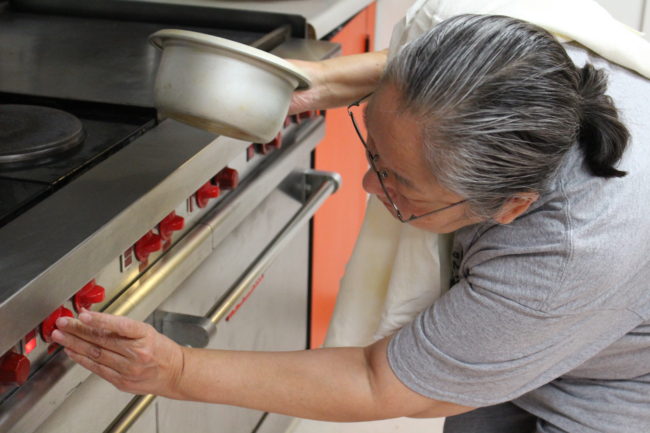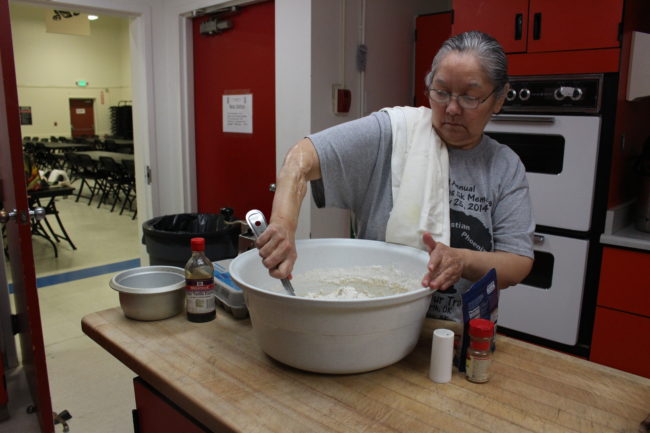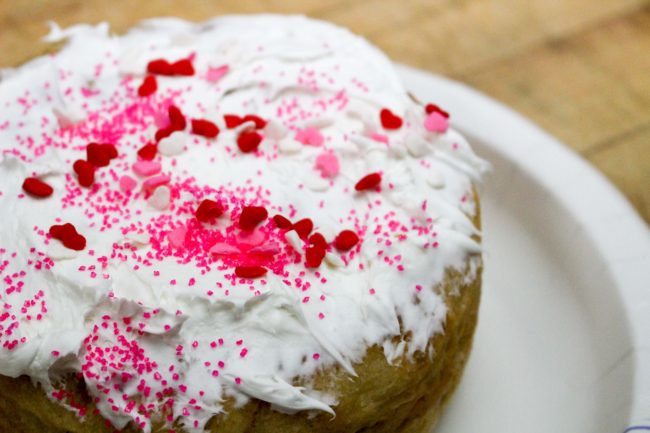Easter was last weekend but some Russian Orthodox Christians will observe it this Sunday. That’s where Easter, or what they call Pascha, lands on the Julian calendar. There’s a special treat that goes along with the celebration. It’s not a chocolate bunny. It’s called kulich.
Siouxbee Lindoff has been making Easter bread for over 40 years. It’s what she’s known for.
“I’m in such high demand. I posted on Facebook, ‘I’m only making two batches of bread. I’m only making two batches and no more,'” she says.
In the kitchen of the Juneau Tlingit Haida Community Council Building, she sifts flour and sugar into a large mixing bowl. Adding a dab of salt.
“I will add nutmeg, cinnamon, vanilla, cranberries, raisins, pecans,” Lindoff says.
After mixing in the yeast and cracking eggs, she stirs the dough with a spoon.
“My dream is to invest in a big commercial mixer but everything is still done by hand,” she says.
Lindoff measures all of the ingredients by sight. The whole process, she says, is intuitive. If you want to learn how to make kulich from her, she says it’s a hands-on process.
“People will look and say, ‘Well how can you make something and not measure?’ And I thought, ‘By the feel.’ And I don’t mind sharing, I don’t mind teaching. Cause to me, it’s like, saving our traditions,” she says.

Lindoff grew up in the Russian Orthodox church. Her family split their time between Sitka and Hoonah. Her dad was the only Tlingit priest ordained from St. Herman Theological Seminary in Kodiak. She says being a pastor’s kid could sometimes be a burden.
“My mom used to say, when they look at you they say, ‘There’s that father Michael’s daughter.’ Especially when I was doing bad.”
She says her parents were strict but fair. They tried to protect her from the same discrimination they’d endured growing up. But it came at a cost. They refused to teach the Tlingit language.
“My dad said, ‘You will speak the English language. You will use the correct pronunciation. You will enunciate your words correctly. I don’t want to hear no slang.’ He was adamant about that. He didn’t want us to suffer like they had, ” she says.
Lindoff’s father paid for his high school education. Her mother went to Wrangell Institute, which was a boarding school.
“And of course Tlingit was the first language that was spoken at home and she used to have to sit at the head of the class and have a dunce hat on her head. She died never wearing a hat,” she says.
Although her mom didn’t teach her how to speak Tlingit, she did show her the traditional way to make kulich.

“My mom tasted my first bread dough and she said yours taste better than mine. She never baked Easter bread again,” Lindoff says.
Russian Orthodox missionaries landed in Kodiak and the Aleutian Islands around 1780. The religion spread to Southeast almost 100 years later.
Sergei Kan, a professor of anthropology and Native American Studies at Dartmouth College, says the Russian Orthodox offered Christianity that was somewhat more tolerant of Native customs and also open to the use of Native languages. He says the Russian Orthodox Church translated the gospel into Native languages, like Tlingit.
“And I think the fact that the orthodox has survived in Alaska means that it was becoming a true Native church,” Sergei says.
After Siouxbee Lindoff incorporates the ingredients for the kulich, she sets the dough aside to let it rise for the next few hours.
“You can get frozen bread dough and you can go to the store but I don’t think you’ll be able to find kulich in the store,” she says.

Lindoff compares making the bread to other Native customs, like gathering herring roe. It’s a skill she’s passed down to her children.
“When I do things like this, it makes me feel like it’s part of the healing, like not being able to speak Tlingit because of that era where my mom and dad spoke it fluently and we didn’t and they didn’t want us to. But I feel like this is part of that healing now. This is part of us going forward with the traditional ways and saving what we can,” she says.
She’s excited to teach her great-granddaughter how to make kulich. She’s 5 years old and learning to speak Tlingit in an immersion class.